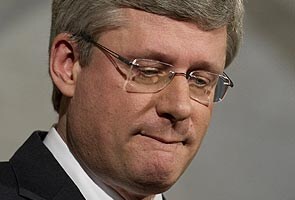
Ottawa:
Canadian opposition parties brought down the Conservative government in a no-confidence vote on Friday, triggering an election which polls show the Conservatives will win.
The opposition parties held Prime Minister Stephen Harper's government in contempt of Parliament in a 156-145 vote for failing to disclose the full financial details of his tougher crime legislation, corporate tax cuts and plans to purchase Stealth fighter jets.
Opinion polls expect Harper's Conservative Party to win re-election but not a majority, meaning he likely will continue to govern with a minority in Parliament, dependent on opposition votes to stay afloat.
The opposition parties combined hold the majority of the seats in Parliament with 160, while the Conservatives have 143.
But in the latest twist, there is a chance that left-of-centre parties might join forces in a coalition if Harper wins another minority government on the expected election date of May 2.
On Saturday, Harper will formally inform Governor General David Johnston, Queen Elizabeth's representative as Canada's head of state, that he has lost a confidence vote, and Canada's fourth campaign in the last seven years will officially start.
"The vote today, which obviously disappoints me, will, I suspect, disappoint most Canadians," Harper said.
Harper might be gambling that an election now will confound conventional wisdom and hand him the majority in Parliament that has eluded him through his five-year tenure as Prime Minister.
He is counting on the economy to help.
Canada has outperformed other major industrialised democracies through the financial crisis, recovering almost all jobs lost during the recession while its banking sector remains intact.
It avoided a property crash, and most economists expect 2010 growth to come in at 3 percent.
The opposition tried to form a coalition when Harper won minority re-election in 2008.
But before he could be defeated in a no confidence vote, he effectively shut down Parliament for three months and successfully rallied public opposition against the coalition.
He is now once again trying to marshal public sentiment against a possible coalition government.
The Conservatives accused the Liberals of treason for uniting with the Bloc Quebecois, a party that seeks independence for Canada's French-speaking province of Quebec.
They were quick to point out that Liberal leader Michael Ignatieff didn't rule out forming a coalition government with the other opposition parties when he was asked about it on Wednesday.
He continued to dodge the question on Friday.
And opposition New Democrat leader Jack Layton has refused to rule out the possibility of a coalition with Ignatieff.
An election would offer the first opportunity to witness a face-off between Harper and Ignatieff since Ignatieff took over the Liberal Party in December 2008.
Ignatieff, 63, is one of Canada's leading intellectuals, an author, historian and TV panel regular in Britain before going into politics.
Harper, 51, is a career politician who has spent the last five years emphasising a more conservative Canadian identity and moving Canada incrementally to the right.
The opposition parties held Prime Minister Stephen Harper's government in contempt of Parliament in a 156-145 vote for failing to disclose the full financial details of his tougher crime legislation, corporate tax cuts and plans to purchase Stealth fighter jets.
Opinion polls expect Harper's Conservative Party to win re-election but not a majority, meaning he likely will continue to govern with a minority in Parliament, dependent on opposition votes to stay afloat.
The opposition parties combined hold the majority of the seats in Parliament with 160, while the Conservatives have 143.
But in the latest twist, there is a chance that left-of-centre parties might join forces in a coalition if Harper wins another minority government on the expected election date of May 2.
On Saturday, Harper will formally inform Governor General David Johnston, Queen Elizabeth's representative as Canada's head of state, that he has lost a confidence vote, and Canada's fourth campaign in the last seven years will officially start.
"The vote today, which obviously disappoints me, will, I suspect, disappoint most Canadians," Harper said.
Harper might be gambling that an election now will confound conventional wisdom and hand him the majority in Parliament that has eluded him through his five-year tenure as Prime Minister.
He is counting on the economy to help.
Canada has outperformed other major industrialised democracies through the financial crisis, recovering almost all jobs lost during the recession while its banking sector remains intact.
It avoided a property crash, and most economists expect 2010 growth to come in at 3 percent.
The opposition tried to form a coalition when Harper won minority re-election in 2008.
But before he could be defeated in a no confidence vote, he effectively shut down Parliament for three months and successfully rallied public opposition against the coalition.
He is now once again trying to marshal public sentiment against a possible coalition government.
The Conservatives accused the Liberals of treason for uniting with the Bloc Quebecois, a party that seeks independence for Canada's French-speaking province of Quebec.
They were quick to point out that Liberal leader Michael Ignatieff didn't rule out forming a coalition government with the other opposition parties when he was asked about it on Wednesday.
He continued to dodge the question on Friday.
And opposition New Democrat leader Jack Layton has refused to rule out the possibility of a coalition with Ignatieff.
An election would offer the first opportunity to witness a face-off between Harper and Ignatieff since Ignatieff took over the Liberal Party in December 2008.
Ignatieff, 63, is one of Canada's leading intellectuals, an author, historian and TV panel regular in Britain before going into politics.
Harper, 51, is a career politician who has spent the last five years emphasising a more conservative Canadian identity and moving Canada incrementally to the right.
Track Latest News Live on NDTV.com and get news updates from India and around the world

